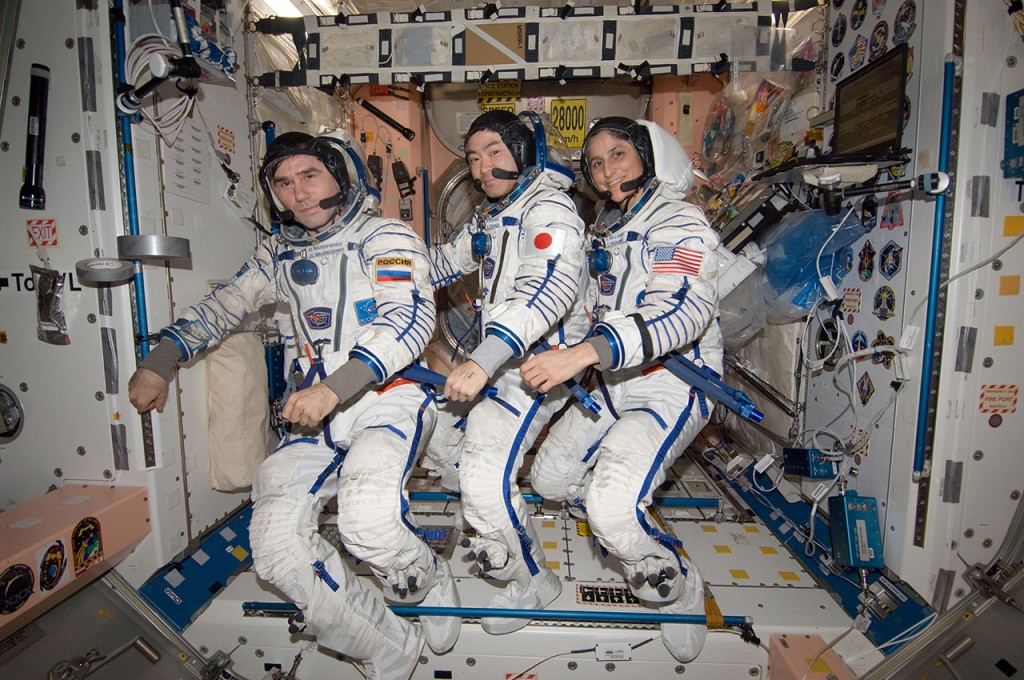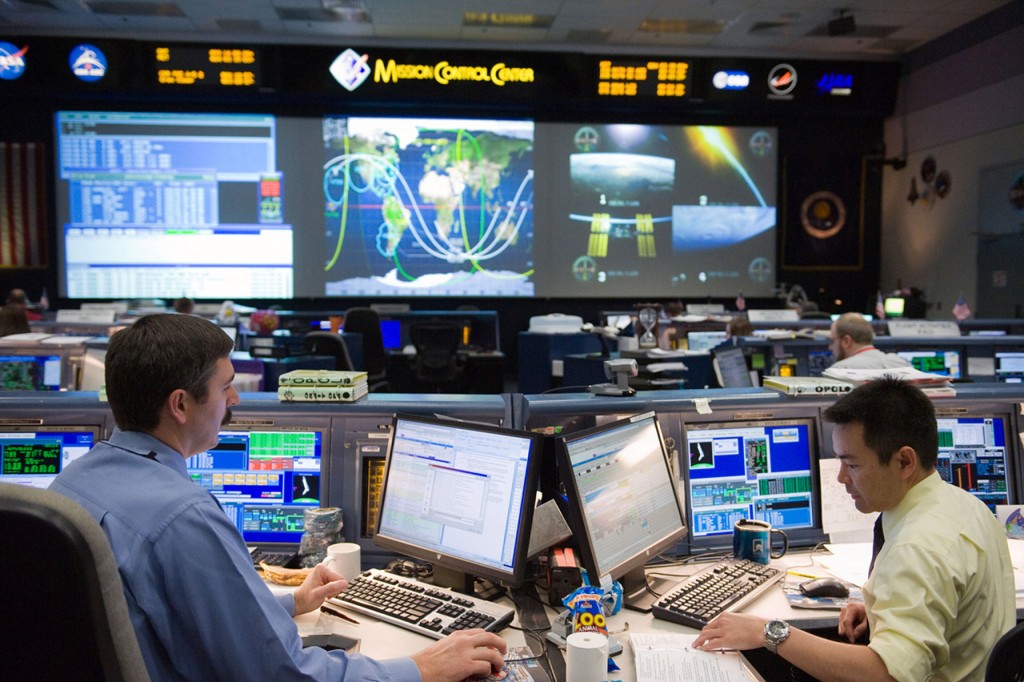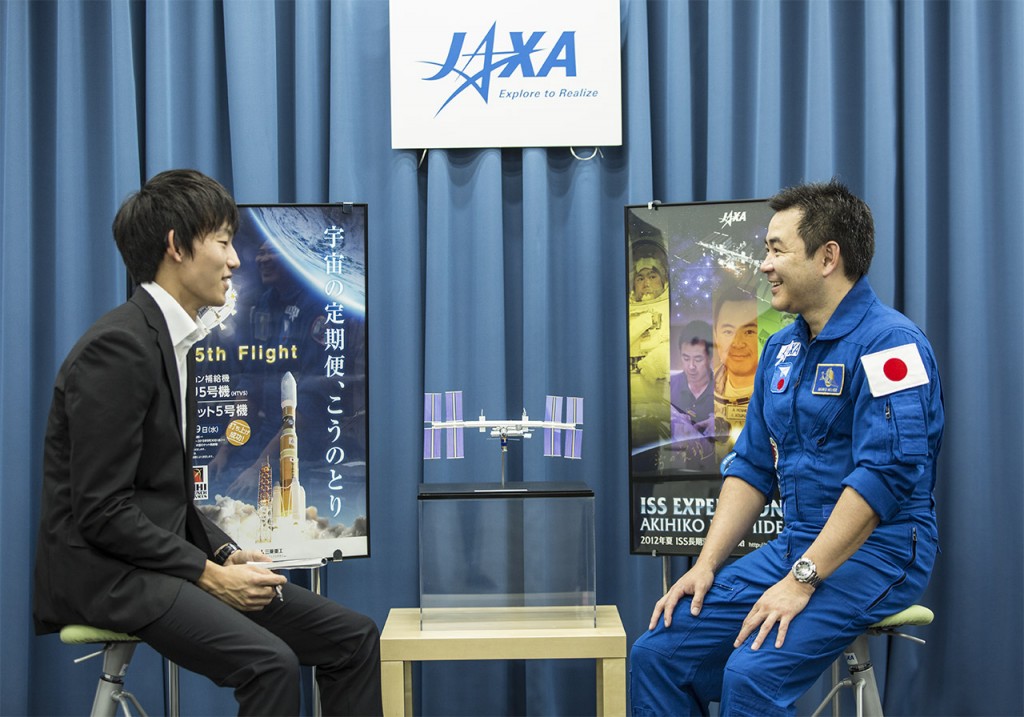By Tomohiro Yamaguchi, U.S. Embassy intern
The “Advice on Studying Abroad” series showcases interviews with Japanese who have studied in the United States. The first interview is with Akihiko Hoshide, an astronaut at the Japan Aerospace Exploration Agency (JAXA), whom I interviewed in mid-September.
I wanted to interview Mr. Hoshide for a variety of reasons, the main one being that earlier in my life I had dreamed of becoming an astronaut myself. Since reading Mr. Hoshide’s blog in those days, I had always wanted to talk with him in person.
Mr. Hoshide aspired to be an astronaut after visiting the Smithsonian National Air and Space Museum in Washington, D.C., when he was four years old. About 35 years later in 2008, he became the sixth Japanese astronaut to fly to space. His assignment was to deliver and install the Pressurized Module – the main module of the Japanese Experiment Module “Kibo” – on the International Space Station (ISS). He went to space again in 2012 and lived on the ISS for approximately 125 days. He set a record for the longest time spent on extravehicular activities for a Japanese astronaut at 21 hours and 23 minutes.

Astronauts Yuri Malenchenko (left), Akihiko Hoshide (center), and Sunita Williams (right) – members of the Expedition 33 crew – prepare to reenter the atmosphere, Nov. 6, 2012 (Japan standard time) (JAXA/NASA).
Studied abroad twice
Mr. Hoshide studied abroad in Singapore as a high school student and in the United States as an adult. At the beginning of the interview, I asked him about his experiences studying abroad and how they shaped who he is today.
Mr. Hoshide said that he started to realize that being an astronaut could be a real career during his high school days when Mamoru Mohri was selected as the first Japanese astronaut to go into space. At that time, he thought about the skills and qualities required of an astronaut, and what came to mind were English language ability and international awareness. He decided to study abroad, thinking that the only way to acquire those qualities was to take the plunge and put himself in an international environment. He had lived in the United States for four years as a young child so he had confidence in his English ability, he said. On the evening of the day he arrived in Singapore for his study abroad program, though, he was “floored”! He was unable to follow the conversation of the students in the dorm at all. The classes, too, were all in English, and he understood almost nothing. Mr. Hoshide said, “For the next three months, I didn’t go out at all. I studied really hard so that I could keep up in my classes.”
After the program ended, Mr. Hoshide returned to Japan and entered a Japanese university. After graduating, he joined the National Space Development Agency of Japan (NASDA), the predecessor of JAXA. He later studied abroad in the United States at the University of Houston’s graduate school, where he developed a specialty in aerospace engineering. He was working at the Johnson Space Center of the National Aeronautics and Space Administration (NASA) while attending graduate school, so he was unable to go to class sometimes. He teamed up with the other students working at the Johnson Space Center and they shared study notes with each other. At work, he sometimes had other staff members cover meetings for him. “I was able to manage because I was supported by those around me,” explained Mr. Hoshide. The connections he made at that time are among the greatest assets he gained from studying in the United States, he said.
After completing the master’s program, Mr. Hoshide was selected as a Japanese astronaut candidate. It was actually Mr. Hoshide’s third attempt to pass the astronaut qualifying exam. The first time, he was a senior in university. He went out to NASDA and tried to apply for the test, but he had to abandon his plan because he did not meet the qualifications to take the test: applicants needed both an undergraduate degree and practical experience. He again attempted to pass the astronaut exam was when he was employed at NASDA. He advanced up to the final test but ultimately was not selected. That was when he started thinking about studying in the United States, he said. When asked why he was selected on his third attempt, he said that he thought it was because he had improved overall through his work experience and study abroad in the United States. He probably answered that way because he knew how much he had grown since his second try.

Astronaut Akihiko Hoshide works as capsule communicator (CAPCOM) for the ISS at the Johnson Space Center, April 9, 2010 (JAXA/NASA).
Never give up!
Mr. Hoshide always writes “Make your dreams come true!” next to his name when he signs an autograph, and he also shares this motto in many interviews. When I asked him about the key to making one’s dreams come true, he said “never giving up.” “I know that dreams don’t necessarily come true even if you don’t give up,” he continued. “But if I had given up and not taken the astronaut exam a third time after failing twice, that path would have been closed to me forever. It is critical that you never give up and that you work hard toward your goal. What keeps you going is your passion for your dream. Having this passion is vital to accomplishing things.” It is often said that you can achieve your dreams if you do not give up, but Mr. Hoshide said that although “dreams don’t necessarily come true,” never giving up is what is most important. Mr. Hoshide said these things while looking directly into my eyes. It moved me deeply to hear these words from a man who had been able to make his dreams come true despite real setbacks.
Before starting the interview, I had told Mr. Hoshide that I had once had the dream of becoming an astronaut but had given up after not meeting the medical qualifications required to apply. In response, he said, “They are relaxing the requirements more and more.” I felt a surge of excitement. I knew that the conditions had been relaxed, but this was now being pointed out to me by an astronaut. Inability to fulfill just one of the conditions for application might not have meant I had to give up on my dream of becoming an astronaut. Mr. Hoshide continued, “First, reach your current goal. Why don’t you think about aiming to go to space after that?” “I will definitely go someday!” I promised.

JAXA Astronaut Akihiko Hoshide responds to questions during the interview.
“Space was frightening”
Next, I asked Mr. Hoshide what space was like. “Space was fun,” he answered, continuing, “Space was black. Space was frightening.” The response that left the strongest impression on me was that space was frightening.
“I could see the Earth and space out the window, and I stared out at it for a long time wondering where the limits of space were. It was pitch-black, and – I know this is obvious, but – space has no bottom. No matter how hard I tried to focus my gaze on it, I felt like there was no barrier between us and it would swallow me up more and more. There was a rumbling sound, and I was overcome by the sensation of being swallowed up. This feeling of being swallowed up was scary. Space is frightening.”
I can imagine the scene he described, but I cannot imagine the sensation he felt. When I heard this story, I was filled with an overwhelming desire to go to space. What Mr. Hoshide said after that struck a chord with me: “If there were no Earth, humanity could not go to space. It is because there is the Earth and people on Earth support those of us in space that we can live in space.”
Message from Mr. Hoshide
I imagine that many people dream of becoming an astronaut when they are young. I always yearned to be an astronaut, but it seemed unrealistic. As I looked into Mr. Hoshide’s eyes, listened to his story, and learned of the various setbacks he faced, I felt much closer to him.
In the interview, Mr. Hoshide stressed the importance of “never giving up” and “trying new things.” For some time now it has been said that Japan is “shrinking.” What should we, Japan’s young generation, do about this? Like Mr. Hoshide, perhaps we need to step outside our comfort zones and challenge ourselves. There are many ways to do that, but I think one option is to study abroad.
At the end of the interview, Mr. Hoshide offered the following message for the young generation:
“It is possible to keep things easy by staying in the familiar environment you’re in now. I used to do that, too. But, if you step out of your comfort zone and expose yourself to a different environment, you’ll be stimulated. If you do that, I think your field of vision will broaden and you’ll gain new ways of thinking and new values. In my case as well, there are many things I wouldn’t have learned if I hadn’t studied abroad. I really want young people to try new things, and I believe that doing so will open doors to their future. Good luck!”






COMMENTS0
LEAVE A COMMENT
TOP